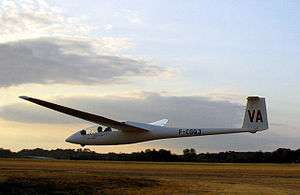Schempp-Hirth Janus
The Schempp-Hirth Janus is a high performance two-seat glider that was built by Schempp-Hirth GmbH. It was the first high-performance two-seater.
| Janus | |
|---|---|
 | |
| Janus Ce | |
| Role | Two Seater-class sailplane |
| National origin | Germany |
| Manufacturer | Schempp-Hirth |
| Designer | Klaus Holighaus |
| First flight | May 1974 |
| Number built | 300 |
| External image | |
|---|---|
Design and development
The design was by Dipl-Ing Klaus Holighaus and the prototype first flew in May 1974. The production examples incorporated several improvements in January 1975. The Janus has a glass-fibre monocoque fuselage similar to that of the Nimbus-2 but the cockpit section is lengthened to accommodate the two pilots in tandem with dual controls under a right-hand side-hinged one-piece canopy. Landing gear consists of either a non-retractable main wheel (Janus A, B & C) or a retractable main wheel (later models of Janus C and all Ce's) with a drum or disc brake, and a nose-wheel. The two-piece wings have 2° forward sweep on the leading edge, and have camber-changing flaps which are operated between +12° and -7°. The Janus has upper-surface airbrakes, and although uncommon the Janus C could also be fitted with a tail parachute.
Production
100 Januses were built by early 1980 plus three motorised Janus CMs. It is particularly suitable for instruction in cross-country flying in gliders with wing flaps.
Variants
- Janus A
- Janus B
- The Janus B was produced from March 1978. It has a fixed-incidence tailplane instead of the all-moving type previously fitted.
- Janus C
- The Janus C has carbon-fibre wings of 20 m span and a carbon-fibre tailplane.
- Janus Ce
- The Janus Ce was certified in 1991 and incorporated modifications to the cockpit and fin.
- Janus CM
- motorised version with Rotax 535C engine
- Janus CT
- motorised version with Solo 2350 engine
- Janus M
- a motorised version with a Rotax engine mounted on a pylon aft of the cockpit and retracting into the fuselage. The prototype first flew in 1978.
- SCAP–Lanaverre SL-2
- The French developed the Janus as the SCAP–Lanaverre SL-2. (SCAP - Société de Commercialisation Aéronautique du Plessis SàRL) with Lanaverre Industries, It first flew in 1977. The main differences from the Janus A are the provision for water ballast in the wings, a fixed tailplane with elevators, and a more comfortable cockpit.
Specifications (Janus C)
Data from Jane's All the World's Aircraft 1988-89[1]
General characteristics
- Crew: 2
- Capacity: 2
- Length: 8.62 m (28 ft 3 in)
- Wingspan: 20 m (65 ft 7 in)
- Janus B 18.2 m (60 ft)
- Height: 1.45 m (4 ft 9 in)
- Wing area: 17.4 m2 (187 sq ft)
- Janus B 16.6 m2 (179 sq ft)
- Aspect ratio: 23
- Janus B 20
- Airfoil: root:Wortmann FX-67-K-170; tip:Wortmann FX-67-K-15
- Empty weight: 355 kg (783 lb)
- Janus B 365 kg (805 lb)
- Max takeoff weight: 700 kg (1,543 lb)
- Janus B 620 kg (1,370 lb)
- Water ballast: 200–240 l (53–63 US gal; 44–53 imp gal)
Performance
- Stall speed: 70 km/h (43 mph, 38 kn)
- Never exceed speed: 250 km/h (160 mph, 130 kn)
- 180 km/h (97 kn; 110 mph) on aero-tow
- 150 km/h (81 kn; 93 mph) on winch launch
- Janus B250 km/h (130 kn; 160 mph) rough and smooth air
- Janus B170 km/h (92 kn; 110 mph) on aero-tow
- Janus B120 km/h (65 kn; 75 mph) on winch launch
- g limits: +5.3 -2.65
- Maximum glide ratio: 43.5 at 110 km/h (59 kn; 68 mph) at 36.5 kg/m2 (7.5 lb/sq ft) wing loading
- Janus B 39.5 at 110 km/h (59 kn; 68 mph) at 36.5 kg/m2 (7.5 lb/sq ft) wing loading
- Rate of sink: 0.6 m/s (120 ft/min) at 90 km/h (49 kn; 56 mph) at 36.5 kg/m2 (7.5 lb/sq ft) wing loading
- Wing loading: 40 kg/m2 (8.2 lb/sq ft) max
- Janus B 37 kg/m2 (7.6 lb/sq ft)
See also
| Wikimedia Commons has media related to Schempp-Hirth Janus. |
Aircraft of comparable role, configuration and era
Related lists
References
- John W.R. Taylor, ed. (1988). Jane's All the World's Aircraft 1988-89. London: Jane's Information Group. p. 630. ISBN 0-7106-0867-5.